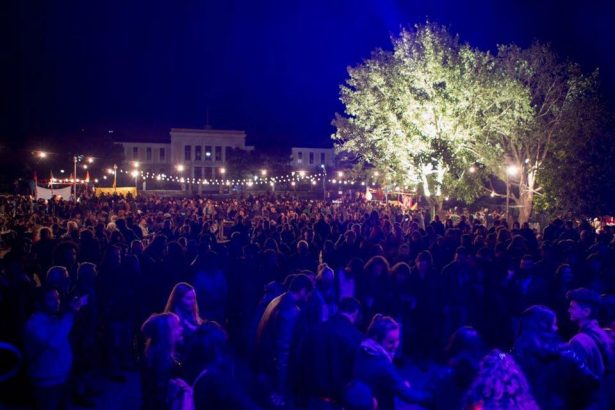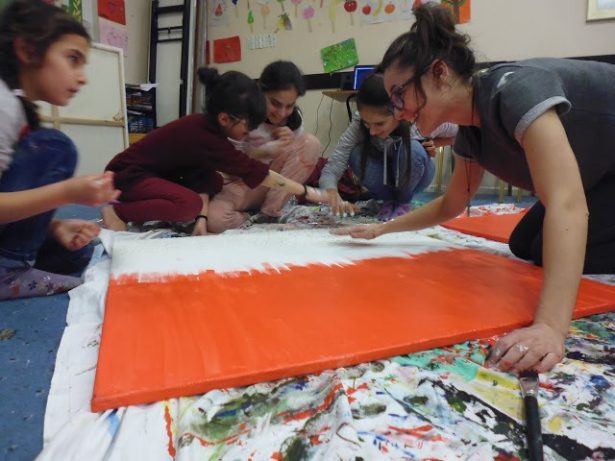It is almost summer in Europe. Temperatures are rising, and many are preparing for vacations somewhere in the Mediterranean, which means searching for accommodation online. “No pool, no minibar, no room service, and nonetheless: the best hotel in Europe” reads the City Plaza Hotel’s homepage. A joke? Yes. A lie? Not at all. While this hotel in Athens, Greece might not offer those conventional services, it provides something far better: Free housing, medical care and meals for hundreds of people who have had to flee their countries.
One year of hope
Last month, the refugee squat at City Plaza Hotel marked its first anniversary with a celebration like no other. Hundreds of people danced cheerfully. The air was filled with Balkan clarinet music and the smell of spring. Over the course of the year, the hotel has provided decent housing for over 1,500 refugees — 400 at any one time — in times of undignified detention camps. It is a model of self-organization and solidarity with refugees — who share living quarters with locals — in times of rising racism and nationalism.
Since the European Union struck a deal with Turkey in March 2016, the borders between Greece and the rest of the continent have been shut down. This left an estimated 55,000 to 65,000 refugees stuck in Greece — 16,000 of whom are located on islands and not allowed to reach the mainland. Thousands of homeless refugees are living in the streets of Athens, including families with small children. In response to this crisis, the Greek state set up more than 49 detention centers and camps.

Activists and refugees had another idea of how to respond. On April 22, 2016 they took over the City Plaza — which, like many businesses since the economic collapse, had been abandoned for six years. Along with eight other self-organized shelters occupied by refugees and activists around the city, the hotel offers displaced people a safe and dignified alternative to the miserable, unhygienic and cruel conditions of the detention facilities.
“What comes first?” asked Yorgos Maniatis, one of the Greek activists supporting the project. “The lives of homeless refugees or the unused private property of the hotel’s owner?”
Uniting labor and immigrants
When the City Plaza went bankrupt in 2010, the management failed to pay the employees their final salaries. According to a court ruling, since they were unable to pay the workers monetarily, everything that is inside the building belongs to the workers. However, the owner prevented auctioning the hotel for years. When the seven-story building was finally occupied last year, the former hotel employees declared that they were happy to offer and share everything. And the activists running City Plaza now support the workers and are planning common efforts to meet the demands of both the former workers and the refugees.
The refugees’ demands include access to housing, education and employment. By providing everything that is needed themselves, the project proves that decent living conditions for everyone is possible, even in a country as burdened by crisis as Greece. And the warm reception that the refugees have received by those living near the hotel demonstrate that poverty is not an obstacle to welcoming people with open arms.
“The neighbors bring some clothes, some food — you know, they are warm. Although their lives are also ruined, they see in the ruins of their lives, the ruins of the lives of other people,” said Maria, one of the Greek activists running the hotel.
“We try to create an example of the way it should be in our societies,” said Nasim Lomani, a former refugee from Afghanistan, who has long been involved in migration politics as an activist in Athens. “We are all people from different countries living together in peace and solidarity, struggling and building our future together.”
Shared living
The project is indeed international. Those staying at the City Plaza are from Syria, Afghanistan, Pakistan, Iraq and Iran, and the 150 supporters come from around the world, including the United States, Scotland, Spain, Italy and many other countries. The motto of the project is telling: “We live together – solidarity will win.” Some of the activists literally live in the hotel and are there around the clock. Both the supporters and refugees lend a hand for all the tasks that need to be done, like preparing food in the stainless steel gastronomy kitchen, sweeping the dusty pavement at the entrance of the building or mopping the interior. Any issues that arise are discussed in group sessions, which are open to everyone living there, and decisions are made together.
City Plaza not only provides the basic needs of housing and food, but volunteers give language lessons, and doctors provide health care pro bono. There is even one area where some of the 160 kids who live at the hotel can rollick about playfully while they are being looked after. This is a relief for these children after weeks of being cooped up in disastrous detention camps.
Ayasha Al Sayed, a mother of three children, remembered that “In Syria, all they hear are the planes, the crashes and the bombs. But here … they are happy.”
Besides the playground, there are 126 rooms and a dining room, kitchen and bar. There is a storage room for food, a health care center, a roof garden, a classroom and a library.
Another important job that rotates among the supporters is security. Given that the safety of the occupants needs to be ensured, there is always someone guarding the entrance, especially at night and during the early morning hours.

And this precaution is necessary. Last year, there was an arson attack on a different refugee squat in another part of Athens. But this is not the only threat these accommodations face. The inhabitants and their supporters are also prepared for the police to repress and close down the hotel. Some are ready to defend their new home even if this means suffering severe repression, as it is the best place they’ve lived in for years. Others are afraid of violent retaliation because they have children. The discussions about possible reactions to an eviction by the police are characterized by mutual respect, independent of different attitudes towards defending the accommodation or protecting oneself.
That the residents have agreed to a concrete and detailed plan of action in case of repression and attack is impressive, but not surprising, since the pro-refugee movement in Greece has a long tradition of nonviolent action. Besides rallies and efforts to educate and inform the public on the disastrous living conditions of refugees, there have been numerous successful occupations in the past. Another widespread form of action among refugees — who have no other means of getting the public’s attention — is the hunger strike. On January 25, 2011, for instance, 300 immigrant workers from various Arabic-speaking countries, started a hunger strike on behalf of all migrants and refugees in Greece, demanding the right to stay and work. After 44 days, during which the strike was accompanied by massive protests, they gained legal residence status and the ability to work. These concessions even included permission to visit their home countries and return without losing their work permits.

These collective actions have won meaningful victories for refugees and their supporters. For instance, the government has already made health care free for everyone regardless of residence status. Besides medical care, the right to education could also be addressed. In October 2016, around 580 school-age refugees began classes in Athens and Thessaloniki, after a related legislative provision had been adopted by Parliament in late summer. Moreover, due to persistent protests regarding detention camps of refugees on the islands, the most vulnerable were released and most of them were incrementally permitted to move in and out of the camps. However, they were not allowed to leave the island until their applications for asylum had been examined.
Further support is needed
Even though this project is an entirely voluntary effort — without any paid staff or public funding — it takes significant resources to pay for electricity, water and 1,200 cooked meals a day. The hotel has many other expenses — for medicines, laundry and school materials — to provide the services that it does.

They do not receive any financial support from the government or the United Nations. The housing program of the U.N. refugee agency in Athens is designed only for people from Syria, while those at City Plaza do not want to make these kinds of distinctions. Therefore, they depend entirely on donations. In order to cover all these costs, supporters have organized several fundraising campaigns. And they receive financial, moral and political support from all over Europe and internationally. Early this summer, the hotel will start its own fundraising campaign as well. Without the donations from all over the world, together with the active on-site support, City Plaza might not have survived as long as it has.
And in this one year they did not just give aid to people in need. “We do not say ‘we are saving refugees.’ We are an example, a voice that says ‘an alternative is possible,’” said Olga Lafazani, one of the core organizers, in an interview for their publicity and fundraising project “A Day in the Life at City Plaza.” She explains how through the processes of self-organization people become empowered — how the tools and platforms they obtain in group sessions allow them to think and act for themselves and understand their own situation, thus step-by-step taking on more initiative and responsibility.
When some of the residents were granted asylum in Germany and were about to leave the country to reunite with the rest of their families, Lafazani had a moving experience that demonstrated the power of City Plaza. “When we said goodbye, one of the women asked me, ‘if things don’t work out, can I come back home?’” she said. “It’s in these moments that I’m reminded that we’ve done something really important. We have created a home.”

This is such an uplifting story – an inspiration for us all.